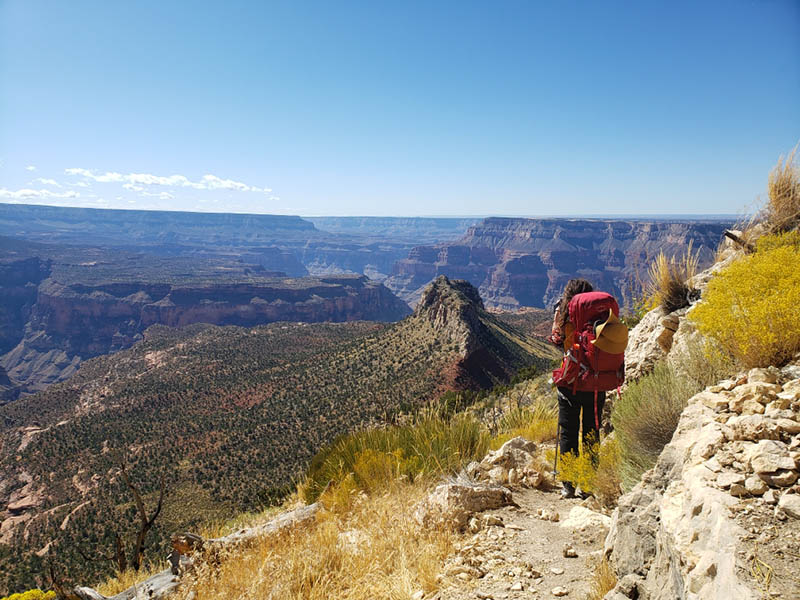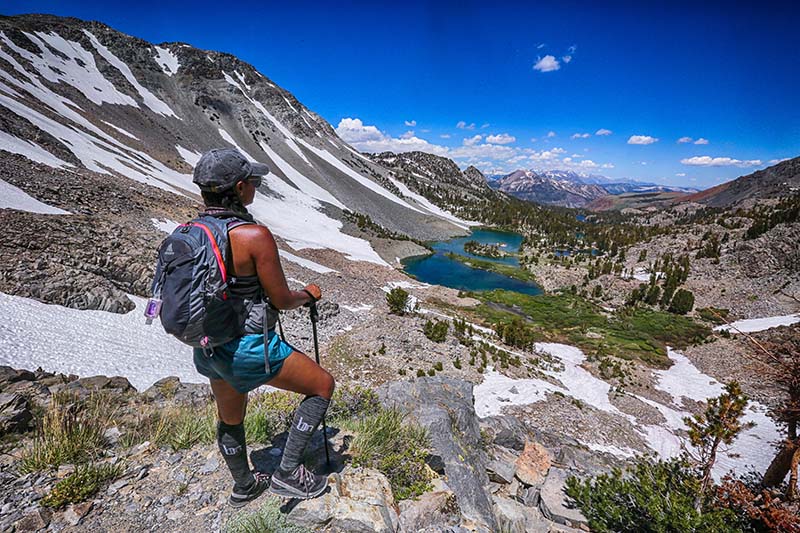How to Train for Hiking Even If You’ve Never Done It Before
This article will help you understand how to train for hiking, whether it is your first hike or you are planning your first long-distance hike.
Hiking provides many physical and mental health benefits. For starters, it gets you outside which is great for your mental health. It improves your cardiovascular health, as well as your muscular health, and provides fresh oxygen to your brain.
Plus, taking a break from the constant rise and grind of our daily lives is exactly what we need (especially right now!) in order to rejuvenate ourselves and gain a new perspective.
This guide will provide insight into how to train for hiking, even if you’ve never done it before, to make sure you have a successful, safe, and enjoyable hike!
Read More: Mental Health Benefits of Hiking + Tips for Beginners

Train for Hiking | How to Get in Shape
Hiking is a wonderful activity that immerses you in the great outdoors. However, if you are not a regular hiker you may struggle to enjoy hiking if your heart feels like it’s going to burst out of your chest or you feel like you can’t take one more step.
The best way to make sure you enjoy a hike is to get in shape first. The two main ways that you want to get in shape for hiking are to focus on cardio and endurance training.
Cardio Training
There are many different ways to improve your cardiovascular health for hiking.
You can either train indoors on a treadmill or you can just take a walk outside. Depending on the hike that you are planning, you may want to consider training for elevation, as well. When you hike to higher elevations there is less oxygen in the atmosphere which puts more stress on your body.

Endurance Training
The next area that you want to focus on to train for hiking is endurance.
Depending on how long of a hike you are planning, you’re going to want to train for that distance. Going on a short walk does not require much training beforehand, but if you are planning a long-distance hike (like an overnight trip) then you will want to focus on strengthening your endurance.
It is important to keep in mind that you not only need to train for physical endurance, but that long-distance hiking also requires mental endurance.
Using positive affirmations will help keep you going when things start to get really difficult on the trail.
These are some great affirmations for mental endurance when hiking:
- “Every step is one step closer.”
- “Just keep going!”
- “Almost there!”
- “This is hard but I am doing it anyway.”
- “I am stronger than I think I am.”
Weighted Backpack Training
Depending on the length of the hike that you are planning, you may want to consider some weighted backpack training. If you are planning a short day hike, you may only need to bring your phone and some water. But for overnight hikes, you may need to be fully prepared with a tent, sleeping bag, and food.

Strength Training
There are many different ways to work on strength training for a hike.
One way is to weightlift, such as at a gym. Or you could practice on the trail with a loaded backpack. You can focus on building your strength as you work on your cardio and endurance training.
I remember going to the gym one time and seeing a guy with a fully loaded backpack using the Stairmaster. At the time, I thought it was ridiculous. But later on, after taking on long-distance hiking myself, I came to realize what a genius idea it is to do weighted backpack training before heading out on the trail.
The last thing you want is to plan a beautiful long-distance hike, only to realize you can not bear the weight of your backpack. Take this into consideration and train accordingly.
Practice packing your backpack with everything that you will need for your hike, and weigh it. This is the target weight that you want to be comfortable carrying over a long distance.

Make a Plan to Train for Hiking
If you are planning your first long-distance hike, you will want to develop a hiking training plan to build your cardio, strength, and endurance, so that your hike will be both successful and enjoyable.
To develop a hiking training plan, you will need to know three things:
- The length of the hike that you are training for
- When you plan to do the hike
- How much time (and how often) you can devote yourself to training
By starting with your target number of miles, you can develop a training plan that will break that target mileage into smaller, more manageable, bits over time.
For example, last fall I went on my first-ever long-distance hiking trip. It was a 30-mile loop with over 10,000 feet of elevation change, in and out of the Grand Canyon.
In order to successfully complete that hike, I knew that I needed to develop a hiking training plan that would improve my cardio, endurance, and strength. I also knew that I had two months to prepare for the trip and that I could devote about one day per week to training.
Start by Taking a Long Walk
In order to determine where your training plan should start, you should go on a long walk to get a baseline of your hiking ability. Take note of how many miles you can walk before your feet and legs start to get sore. This is your baseline.
Experiment with using positive affirmations to see if you can push yourself just a little bit further.
Slowly increase the distance that you hike so that you start to feel more confident and comfortable with longer hikes.
Read More: 4 Beautiful Walks on Cape Cod

Increase the Weight That You Carry
Over time, slowly increase the weight that you are carrying on your back, whether that is loading more gear into your pack for a hike on the trail or the treadmill.
Although you may start out with only a bottle of water, you may want to work your way up to carrying multiple days worth of food, water, and shelter.
One thing that I did not know before I started training for long-distance hiking is that water is the heaviest thing that you will carry! Increase the water weight that you carry as you train to get a realistic idea of your ability.
Increase Elevation
Depending on the hike you are planning, there may be no elevation change, or there may be a lot. This is something you will want to take into consideration when developing your hiking training plan.
Elevation change is an important factor in hiking since the higher the elevation, the less oxygen there is in the atmosphere. Hiking in higher elevations causes your heart and lungs to work harder and can be an extremely uncomfortable feeling if it is something that your body is not used to.
As part of your training plan, hike at a similar elevation as the hike that you are training for, if possible. This will help you feel more comfortable at different elevations, and help your body acclimate better during your hike.

Practice Using Your Gear
One thing that you definitely need to do before you head out on the trail for your first hike is to practice using all of your gear. This will make sure that you not only know how to use your gear, but that all of your equipment is properly functioning.
You do not want to be out in the middle of nowhere and realize that the gas on your stove will not ignite or that some of your tent poles are broken and that you will not be able to set up a shelter for the night.
Take the small amount of time that is needed in order to practice setting up and using all of your gear before you head out on your first hike. By practicing using your gear, you will be even more confident in your skills and your ability to go on a hike.
By following this guide, you can make sure that you will have a successful and enjoyable time out on the trail while you’re hiking.
In summary, you can train for hiking if it is something that your body is not used to. The main areas that you need to focus on for training are your cardiovascular health, your strength, and endurance training, all of which can be done at home, at a gym, or on the trail. Practice using all of your gear and make sure that you are able to carry the weight of it all. If you train appropriately, you will be able to accomplish any hike that you can dream of!
About the Author
Tori Cook is a freelance holistic lifestyle and travel blogger based in Lake Tahoe. Because of her own struggles with mental health, Tori has dedicated herself to learning about and living a holistic lifestyle in the pursuit of happiness. She is a published university graduate with a scientific background in language and psychology. Tori lives an active and healthy life outdoors in order to combat her struggles with depression and anxiety. She is on a never-ending journey of self-improvement and manifesting the life of her dreams.
You can see more of her work and follow her journey on Instagram @torifromtahoe.
SAVE THIS POST FOR LATER!


Share Your Story
Submit a Guest Post!
I accept quality contributions from guest writers on themes related to self-care and travel. I like guest posts to be helpful (answer a question or solve a problem) and supported by a personal story or anecdotes.
I love highlighting the experiences of female travelers of all backgrounds and travel styles. If you have an idea, I’d love to chat about how it can fit into She Goes With Purpose.